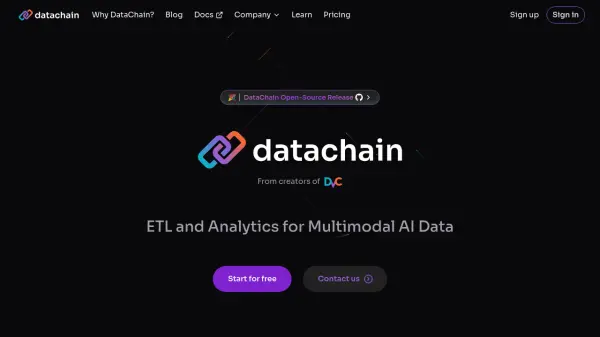What is DataChain?
DataChain is a platform designed to streamline the process of working with unstructured data for AI applications. It facilitates the connection between data stored in various cloud environments (like S3, GCP, Azure) or locally, and advanced AI models and APIs. This allows users to leverage foundational models and machine learning techniques to gain rapid insights from complex data types such as videos, PDFs, and audio files, without needing to move the raw data from its original location.
The tool emphasizes efficiency and reproducibility through features like dataset versioning and data lineage tracking. It utilizes a Python-based stack, aiming to accelerate development by simplifying data wrangling tasks compared to traditional SQL-based methods. DataChain is built to handle large-scale operations, capable of processing millions or even billions of files, making it suitable for demanding AI and machine learning projects that require robust data preparation and management.
Features
- Cloud Storage Integration: Connects with unstructured data in S3, GCP, Azure, or local storage.
- AI Model Integration: Leverages foundational models, LLMs, and ML models via API calls for data insights.
- Instant Data Insights: Quickly understand unstructured files using AI.
- Pythonic Stack: Utilizes Python for data wrangling, reducing reliance on SQL.
- Dataset Versioning: Guarantees traceability and reproducibility for datasets.
- In-Place Analysis: Analyzes raw data in its storage location, managing metadata separately.
- Multimodal Data ETL: Processes videos, PDFs, audio, and other unstructured data types.
- Data Lineage Tracking: Tracks code and data dependencies for reproducibility.
- Large-Scale Processing: Efficiently handles millions to billions of files.
- Cloud-Agnostic: Supports various cloud storage and compute environments.
- Open Source Option: Offers a free, open-source version.
- Development Environments: Provides both CLI and Web UI.
- Distributed ML Inference: Supports scalable machine learning model application.
- Auto-scaled Compute: Automatically adjusts computing resources based on need.
Use Cases
- Analyzing large volumes of unstructured multimedia data (videos, audio).
- Extracting insights from documents like PDFs using AI models.
- Building reproducible ETL pipelines for AI/ML projects.
- Managing and versioning large datasets for team collaboration.
- Curating and improving the quality of data for AI model training.
- Accelerating data preparation workflows for AI applications.
- Processing and filtering massive datasets stored in the cloud.
Related Queries
Helpful for people in the following professions
DataChain Uptime Monitor
Average Uptime
99.58%
Average Response Time
193.93 ms
Featured Tools
Join Our Newsletter
Stay updated with the latest AI tools, news, and offers by subscribing to our weekly newsletter.











